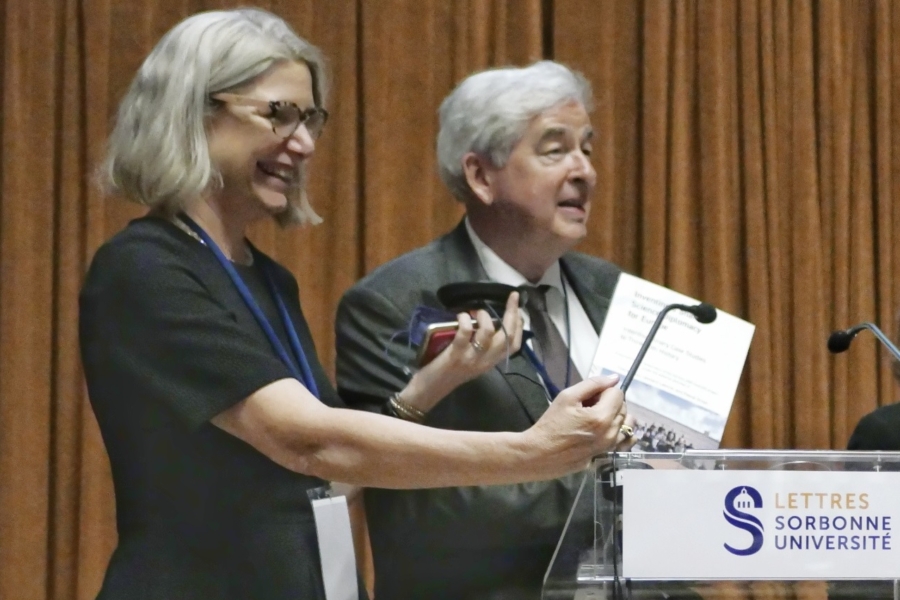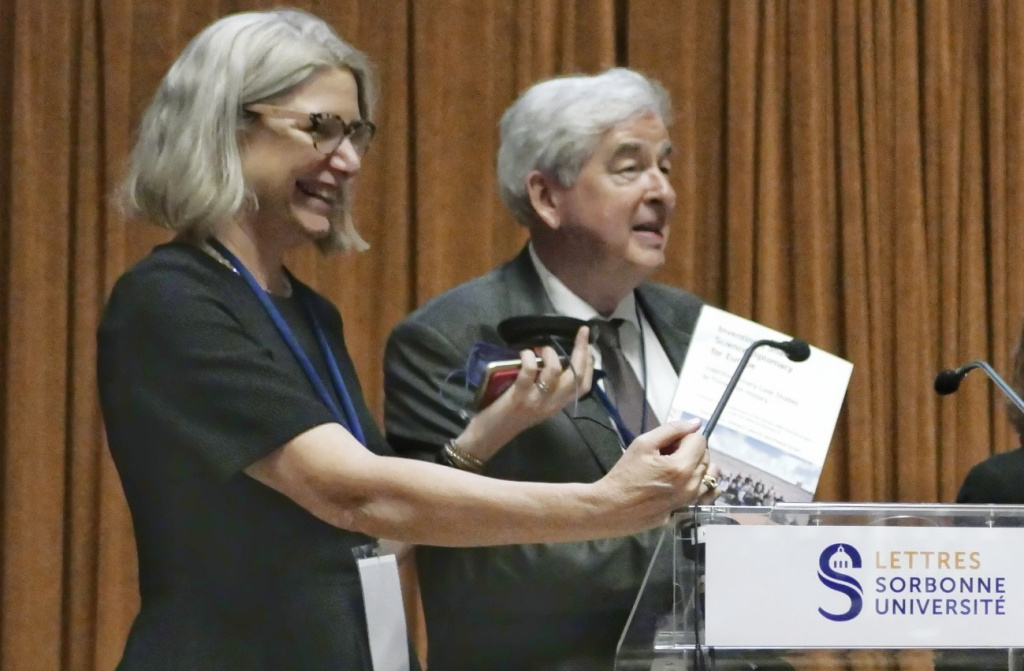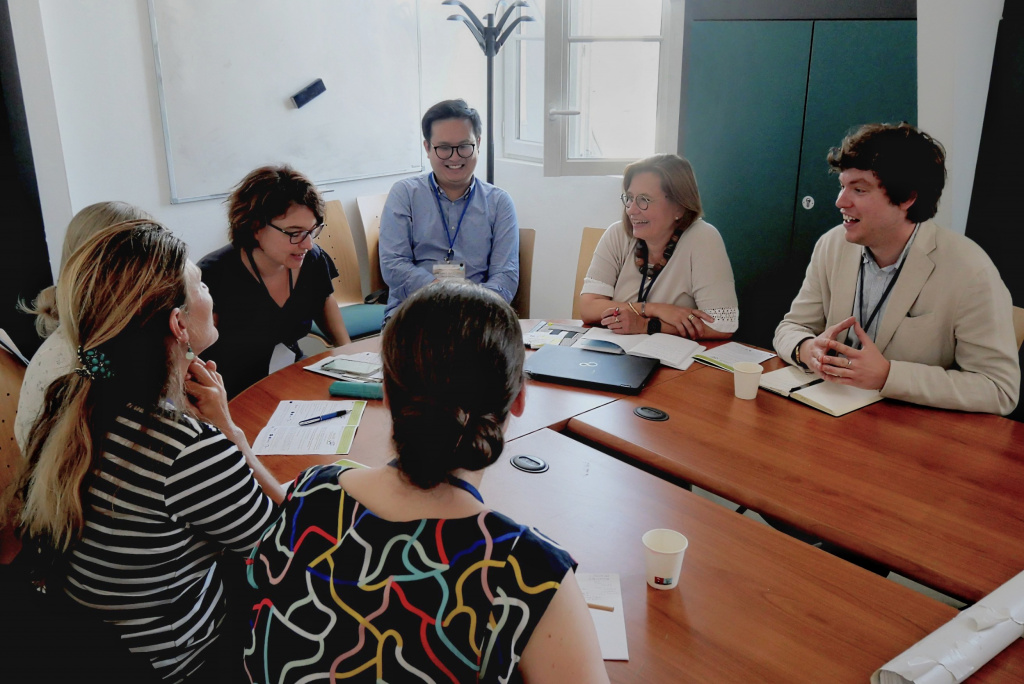Reflections from InsSciDE and Chairing the EU Science Diplomacy Alliance

Interview of former Alliance Co-Chairs and H2020 InsSciDE Coordinators by community manager Daniella Palmberg.

Claire Mays and Pascal Griset, you chaired the EU Science Diplomacy Alliance from January to June 2022. How did you experience this period? What are you proud of? Your chairship corresponded with the last 6 months of the InsSciDE project and a number of significant events for the project. How do you view the transition from the project’s conclusion to a growing and increasingly active Science Diplomacy Alliance?
Pascal Griset: This experience took place in the context of the last semester of the InsSciDE project. It has therefore taken the form of consolidating what had already been achieved by the previous presidencies of the Alliance while bringing to the Alliance the initiatives funded by the InsSciDE project. Energy was also devoted essentially to the organization of the last InsSciDE Open Conference in Lisbon and to the final symposium in Paris. Lisbon allowed to widen the perspectives of InsSciDE and to open them to new problematics and spaces in connection with the contributions of all the partners of the Alliance. Paris has achieved a double objective: Present the main successes of InsSciDE and make the Alliance better known through its first live "Big Event". This was all the more meaningful as this conference took place after the most difficult time of the COVID crisis. A very large audience, both at the Sorbonne and at UNESCO, allowed us to break with the time of "at a distance" relations while keeping a link with those who are geographically far away thanks to streaming online. The Thursday morning Alliance workshops were a great success, bringing together academics and practitioners. The various themes, which were oriented towards the future activities of the Alliance, were discussed with creativity and energy.
Claire Mays: I had a slightly different perspective on that first semester of 2022 – while the rest of the InsSciDE Coordination team was largely focused on the Lisbon and final Paris events, I was in very deep and constant interaction with the InsSciDE researchers to develop our #BigBookofScienceDiplomacyCaseStudies, as InsSciDE’s Twitter account nicely identified it. The twenty-eight historical cases reveal a huge diversity of science diplomacy configurations. I think this collection both challenges some classical attempts to find a simplifying conceptual order in science diplomacy, and offers a very rich resource to those who wish to go beyond.
It was printed just in time for the Paris conference. The book was awaited, appreciated, and even praised as a “calling card” for future activities of the Alliance. That was a very nice turn: from closing our years of work together to realizing that the book is received as a new opening for our community. The book can be consulted here, and each case downloaded in open access: www.zenodo.org/communities/insscide.
As for the Alliance, we appreciated the tight cooperation of the founding, past and future chairs. Relationships with Elke Dall, Angela Schindler-Daniels, Stella Reschke, Luk van Langenhove, Eric Piaget, and 2023’s first chairs Fernanda Bajanca and Mostafa Moonir Shawrav are exemplary and ones we want to keep for a very long time. It was great to welcome new Alliance members Research Lab Democracy and Society in Transition (Danube UCE Krems), IIASA, and INAR, all represented at our Paris conference. INAR’s representative, Warsaw SD School alumna Stephany Mazon, stepped up at the last minute to facilitate the group reflecting on “Knowledge-based policy: How universities and science networks can organize to inform decision making”. We wanted the Alliance’s first face-to-face workshops to be extremely interactive, and we were delighted with the engagement of participants alongside a broad range of InsSciDE, Alliance and other friends as moderators: several of our historians, political scientists and archaeologists, our InsSciDE advisor Prof. John Krige, Alliance Advisory partners, represented by Jan Marco Müller (on the move from the European External Action Service to the European Commissions Directorate General for Research and Innovation, still responsible for the Science Diplomacy portfolio), and deeply involved counterparts like Katalin Alfoldi from the COST Association.

Also very satisfying and timely was the Alliance hybrid roundtable at SAPEA’s “Science Advice Under Pressure” event, organized by Angela and Stella, which I co-moderated from afar. Indeed, we found ourselves examining science diplomacy’s moral and decision pressures created by the Russian aggression on Ukraine. InsSciDE historian Anna Åberg spoke of how Big Science organization ITER has invented systems of reciprocity and compromise to enable a diversity of member states, technological approaches and political philosophies to work and achieve long-term together. This was very meaningful, as was the personal input of a Ukrainian colleague from IIASA – another organization that has navigated for many years the stormy geopolitical seas in ongoing invention of science diplomatic relations. The roundtable report is here: www.science-diplomacy.eu/takingtheheatoff/
Pascal Griset: The specific contribution of InsSciDE, in the long run, will be, I hope, the validation of methodologies that will allow a wide range of human and social sciences to interact on the subject of science diplomacy, considering the historical depth of the issues addressed. The achievements of our project will thus find their place in association with what El CSID and S4D4C have accomplished in a very complementary way. It is a solid base that will allow us to analyze what science diplomacy is from different perspectives. The historians' viewpoint helps to avoid the standardization of analyses that is so common when agreed models, in line with the zeitgeist and a certain complacency, are adopted. It creates uncertainty and finally looks for exceptions rather than long series… In this sense, history can be destabilizing for practitioners. The fact of having convinced many of them that a method for passing on knowledge and experience through history, and even informing strategy, could be less "comfortable" but much more stimulating than traditional teaching seems to me to be a key point in the final outcome of our project.
How will InsSciDE’s legacy live on through the Alliance? What is your vision for the Alliance and European Union science diplomacy?
Pascal Griset: I hope that the specificity of the ideas developed by InsSciDE will remain within the Alliance. I will try to contribute to it. It will be a question of keeping a critical gaze on the main postulates of science diplomacy and of bringing to the various working groups a spirit combining pragmatism and intellectual ambition. The researchers who have brought InsSciDE to life are deeply involved in the birth of the Alliance. They carry their own themes and, because of their diversity, constitute a particularly positive contribution for our Alliance.
It would undoubtedly be very pretentious to assert a "vision" for the European science diplomacy. Europe is facing multiple structural challenges. A better cooperation between the main DGs of the Commission, starting of course with DG Research, and the EEAS seems to be an orientation likely to allow a stronger expression of a European science diplomacy. It should go hand in hand with a strengthening of the network of Science Counselors in the Delegations of the European Union. These professionals are doing a remarkable job and are already succeeding in getting national diplomacy to converge on specific objectives when these are clearly identified and to allow Europeans to take collective ownership of major issues. They concretize a first form of "shared science diplomacy" for Europe, which was the initial concept of InsSciDE. The Alliance is and will be nourished by multiple contributions. Beyond a will to extend the contributions of InsSciDE, I would like to encourage the development of multilingualism. The sole use of English, undeniably pragmatic, penalizes the quality of exchanges and limits intellectual ambition. Moreover, it can create asymmetries in the debates depending on the degree of fluency in this language. Brexit makes this situation even more paradoxical for the European Union. This theme was one of the topics discussed at the InsSciDE final conference in UNESCO and I hope to be able to carry it forward with other colleagues for the future in my university but also within the Alliance.
Having examined science diplomacy through a lens of social sciences and humanities, what do you recommend to practitioners?
Pascal Griset: What struck me during the discovery of this world of "practitioners" is the extreme diversity of identities and professions. A typology of "science diplomats" would reveal very diverse statuses, education, and cultures, since science diplomacy cannot be summed up in the sole action of the diplomatic corps. I was also impressed by the constraints that weigh on these actors. It is undeniably a complex profession that has the charm but also the difficulties inherent to a space located in necessarily hybrid zones of action. So there is little advice, at most that of situating themselves in relation to the actions of their predecessors and of situating themselves not only in space but also in time. The role of the academies of science and engineering is still, in my opinion, insufficiently appreciated.
Claire Mays: I would encourage continued, personal enthusiastic participation by each one in the conscious community-building that has arisen thanks to the Alliance, the Cluster that preceded it, the work led by Jan Marco to talk globally about SD agendas, the many strong initiatives emerging throughout the world and particularly visible in Latin America and in India, and the historical organizations like UNESCO-TWAS and INGSA. Social sciences tell us that reflexive collective action in diversity is most adequate to face complex socio-technical challenges. The humanities teach us that individualities are important and that not only rational thought is involved in each societal interaction and endeavor. Consciously bringing the best of our curiosity, our intuition and our skill, and our desire to move forward together (which involves also our heart) can only improve our prospects as we face climate and geopolitical crises. Our InsSciDE case study book indeed reveals the diverse and contradictory phenomenology of such human interactions in the context of science and diplomacy; I reviewed this historical reality in my editorial introduction (https://zenodo.org/record/6639894#.Y2EAKnbfu5c) and will be pleased to observe the community’s responses to this learning.
And for you, what will be the next steps in the community?
Pascal Griset: The task of project coordinator and principal investigator is both exciting and frustrating. Apart from the very trivial fact of having to solve a number of problems with no real « intellectual" dimension, it is a matter of ensuring the cohesion of a consortium composed of partners with different cultures and sometimes contrasting conceptual and methodological approaches. It is extremely enriching and I have learned a lot from it. However, this also implies producing a consensus discourse which does not permit one to freely advance with his own ideas. They are obviously present, but they cannot be pushed forward in a truly dynamic way. I will now have a little more time and freedom to integrate into my research what I have learned over the last five years. Although my work, since my thesis, has included in large part the history of international relations, the strictly "diplomatic" issues that were present were dealt with in an implicit or indirect manner. The experience of InsSciDE and the Alliance will allow me, I hope, to develop studies about Innovation Diplomacy, a concept that corresponds well to my way of understanding history, connected to present-time issues at the crossroads of economics, science and technology. If this can be done in connection with European initiatives that allow these questions to be advanced and continue to articulate the historical approach, reflection and contemporary action, I will of course be particularly pleased…
Claire Mays: I am returning to my world of hands-on mediation of Responsible Research and Innovation in socio-technical areas: defining and developing safe and sustainable design of nanomaterials; exploring the conditions under which geological carbon storage could be adopted as part of local community repertoires in five European countries; engaging experts and European civil society in assessing the sustainability of nuclear power as a climate-mitigation energy source. It is always well-received and thought-provoking to invite colleagues in these areas to consider their personal role as de facto science diplomats. My InsSciDE experience, and the opportunity to continue with my lab Symlog as part of the Alliance, provide a deep new transversal dimension to my work. And the friendships formed are a great satisfaction.
Thank you, Claire and Pascal, for your time and efforts!